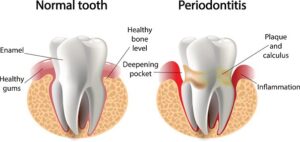
What Causes Periodontal Disease?
Periodontal disease is caused by bacteria in dental plaque, the sticky substance that forms on your teeth a couple of hours after you have brushed. Interestingly, it is your body’s response to the bacterial infection that causes most of the problems. In an effort to eliminate the bacteria, the cells of your immune system release substances that cause inflammation and destruction of the gums, periodontal ligament or alveolar bone. This leads to swollen, bleeding gums, signs of gingivitis (the earliest stage of periodontal disease), and loosening of the teeth, a sign of severe periodontitis (the advanced stage of disease).
Practicing good oral hygiene and visiting your dentist regularly (about once every six months, or more often if you have gum disease) can prevent periodontal disease. Daily brushing and flossing, when done correctly, help remove most of the plaque from your teeth.
If oral hygiene slips or dental visits become irregular, plaque builds up on the teeth and eventually spreads below the gum line. There, the bacteria are protected because your toothbrush can’t reach them. Good flossing may help dislodge the plaque; but if it is not removed, the bacteria will continue to multiply, causing a more serious infection. The buildup of plaque below the gumline leads to inflammation of the gums. As the gum tissues become more swollen, they detach from the tooth forming a space, or “pocket,” between the tooth and gums. In a snowball effect, the pockets encourage further plaque accumulation since it becomes more difficult to remove plaque. If left untreated, the inflammatory response to the plaque bacteria may spread to the periodontal ligament and alveolar bone, causing these structures to be destroyed.
Another problem is that if plaque is allowed to build up on teeth, over time it becomes calcified, or hardened, and turns into calculus (commonly called tartar). Since calculus is rougher than tooth enamel or cementum (a layer that covers the tooth root), even more plaque attaches to it, continuing this downward spiral. Using a tartar-control toothpaste may help slow accumulation of calculus around your teeth, but it can’t affect the tartar that has already formed below the gum line.
Risks and Prevention
Although bacterial plaque buildup is the main cause of periodontal disease, several other factors, including other diseases, medications and oral habits, also can contribute. These are factors that can increase your risk of gum disease or make it worse once the infection has set in.
- Genetics — Researchers believe up to 30% of the population may have a genetic susceptibility to periodontal disease. Having a genetic susceptibility, however, doesn’t mean gum disease is inevitable. Even people who are highly prone to periodontal disease because of their genetic make-up can prevent or control the disease with good oral care.
- Smoking and tobacco use — Smoking increases the risk of periodontal disease and the longer, and more one smokes, the higher the risk. If periodontal disease is present, smoking makes it more severe. Smoking is the main cause of periodontal disease that is resistant to treatment. Smokers tend to collect more tartar on their teeth, develop deeper periodontal pockets once they have gum disease and are likely to lose more bone as the disease progresses. Unlike many other factors that affect the health of your gums, you have control over this one. Quitting smoking can play a major role in bringing periodontal disease under control.
- Misaligned or crowded teeth, braces or bridgework — Anything that makes it more difficult to brush or floss your teeth is likely to enhance plaque and tartar formation above and below the gum line, which increases your chance of developing gum disease. Dentists and periodontists can show you the best ways to clean your teeth, especially in hard-to-clean circumstances. For example, there are special tools and ways of threading floss to clean around bridgework or slide under braces. And if overcrowded or crooked teeth are a problem, your dentist might recommend orthodontics to straighten out your smile and give you a better chance of preventing disease.
- Stress — Stress can worsen periodontal disease and make it harder to treat. Stress weakens your body’s immune system, which makes it harder for your body to fight off infection, including periodontal disease.
- Fluctuating hormones — Whenever hormones fluctuate in the body, changes can occur in the mouth. Puberty and pregnancy can temporarily increase the risk and severity of gum disease, as can menopause.
- Medications — Several types of medications can cause dry mouth, or xerostomia, including antidepressants, diuretics and high blood-pressure medications. Without the protection of adequate amounts of saliva, plaque is more likely to form. Other medications may cause the gums to enlarge, which in turn makes them more likely to trap plaque. These medications include phenytoin (Dilantin and other brand names), used to control seizures; cyclosporine (Neoral, Sandimmune), used to suppress the immune system; and nifedipine (Adalat, Cardizem and others) and other calcium channel blockers, used to treat angina or heart arrhythmias.
- Diseases — Although the exact mechanisms aren’t totally understood, certain diseases increase susceptibility to periodontal diseases. For example, people with diabetes are more likely to get periodontitis, than people without diabetes and it’s likely to be more severe. Other diseases, such as leukemia, inflammatory bowel disease and HIV infection, also can increase the risk. Having one of these diseases will make control of periodontal disease more difficult, but a good periodontist or dentist who is aware of the additional risks and difficulties should be able to offer the kind of guidance needed to maintain your periodontal health.
- Poor nutrition — Nutrition is important for overall good health, including a working immune system and healthy gums and mouth.


